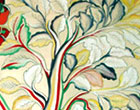| |
FOURTH YEAR - Course Outline
Study of Pathology with Application to Clinical Practice
- Physical examination
- Symptoms and signs
- Pathology of the Five solid and Six hollow internal organs – Pathological signs and Cures
- Internal medicine
- Neurology and psychic disturbance
- Rheumatology
- Gynaecology
- Paediatrics
- Oncology
- Infectious diseases
- The Five Special Sense Organs
- Demonology
- Practical procedures
- Emergency medicine and traumatology
- Training in the Five Action Therapies – appropriate use of medicines for purging, diuresis, etc
- Supervised Clinical practice
- This will include clinical training at traditional Tibetan hospitals in Tibet
- Further clinical observation and supervised practice will also be available at selected venues in Western clinical settings
- Compounding of medicines
- This will include trainingin the Tibetan hospital setting
- Further observation and practice will also be available at selected venues in Western settings
Further Info:
- Subjects will be taught in English, with Tibetan medical terminology; students are expected to pursue study in the basics of Tibetan language.
- All teaching is based on the rGyud bZhi – The Four Tantras.
- Course manuals are published by the International Academy for Traditional Tibetan Medicine (IATTM); and are based on The Four Tantras with application to practising TTM in the Western context.
- For students without a background in Western medicine or allied health, students are expected to acquire a minimum level of study in anatomy, physiology, and pathology. From time to time, the International Academy for Traditional Tibetan Medicine will hold courses in Western anatomy, physiology and pathology, which will be conducted by qualified medical practitioners.
- In order to deepen their knowledge and to gain greater experience in all aspects of TTM, students are encouraged to study the specialty courses in Ku Nye Tibetan Massage, Mantra Healing, Dream Analysis, Sa Che (traditional Tibetan Geomancy) and the Yuthok Nyingthig practice. These are valuable adjuncts to the TTM course.
- On full completion of the four-year Traditional Tibetan Medicine course students will be issued with a Certificate of Attendance from the Qinghai Traditional Tibetan Medicine Hospital, Xining, as well as a Diploma from the International Academy for Traditional Tibetan Medicine, London.
|
|
|
 |
|


